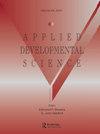威胁和剥夺是第一代和第二代拉丁裔青年创伤后应激和抑郁症状的明显预测因素
IF 1.7
3区 心理学
Q3 PSYCHOLOGY, DEVELOPMENTAL
引用次数: 2
摘要
摘要近年来的不良童年经历(ace)研究强调,不同的不良童年经历会影响精神病理的发生和发展过程,社会政治环境对边缘化青少年的不良童年经历有影响。在移民相关不良童年经历模型的指导下,我们探讨了移民家庭中第一代和第二代拉丁裔青年创伤后应激障碍(PTSD)和抑郁症与不同ace(移民执法恐惧和感知经济困难)之间的关系。参与者(n = 306)包括来自两个州11所高中的学生(58%为女生;25%为17岁或以上)。53%的人是第一代学生,80%的人出生在墨西哥或中美洲,或者父母来自墨西哥或中美洲。我们发现,在考虑了其他关键协变量后,移民执法恐惧预测了更大的创伤后应激障碍症状。在所有的子量表中,感知到的经济困难都与抑郁有关。调查结果强调,需要采取多维方法来评估和了解不良经历,包括对移民执法的恐惧,如何影响拉丁裔移民家庭青年的心理健康。我们要感谢参与研究的学区和所有参与研究的学生的贡献。披露声明本文是兰迪·卡普斯在移民政策研究所工作期间编写的。本文中表达的观点是作者自己的观点,并不反映美国国立卫生研究院、卫生与公众服务部或美国政府的观点。其他作者报告说,没有相互竞争的利益需要申报。数据可用性声明由于数据的敏感性,以及识别的可能后果,这些数据目前没有公开可用。但是,可以根据要求提供额外的或补充的分析。本研究由罗伯特·伍德·约翰逊基金会和国家少数民族健康和健康差异研究所通过休斯顿大学成瘾研究和癌症预防健康研究中心资助[U54MD015946],其中T.A.C.得到了资助。本文章由计算机程序翻译,如有差异,请以英文原文为准。
Threat and deprivation as distinct predictors of posttraumatic stress and depression symptoms in first and second generation Latinx youth
AbstractRecent adverse childhood experiences (ACEs) scholarship emphasizes that differing ACEs affect the onset and course of psychopathology, and that sociopolitical context contributes to ACEs experienced by marginalized youth. Guided by the Immigration-Related Adverse Childhood Experiences Model, we explored the associations between different ACEs—immigration enforcement fear and perceived economic hardship—on posttraumatic stress disorder (PTSD) and depression among first and second-generation Latinx youth in immigrant families. Participants (n = 306) included students from 11 high schools in two states (58% female; 25% aged 17 or older). Fifty-three percent were first generation students and 80% were born in, or had a parent from, Mexico or Central America. We found that immigration enforcement fear predicted greater PTSD symptoms after accounting for other key covariates. Perceived economic hardship was associated with depression across all subscales. Findings highlight the need for a multidimensional approach to assess and understand how ACEs, including immigration enforcement fear, influence mental health for youth in Latinx immigrant families. AcknowledgmentsWe would like to thank the participating school districts and all of the students who participated in the study for their contributions.Disclosure statementThis article was prepared while Randy Capps was employed at the Migration Policy Institute. The opinions expressed in this article are the author’s own and do not reflect the view of the National Institutes of Health, the Department of Health and Human Services, or the United States government. The other authors report there are no competing interests to declare.Data availability statementDue to the sensitive nature of the data, and the possible consequences of identification, the data are not currently publicly available. However, additional or supplemental analysis are available by request.Additional informationFundingThis work was supported by the Robert Wood Johnson Foundation and National Institute on Minority Health and Health Disparities through the University of Houston’s HEALTH Research Center for Addictions Research and Cancer Prevention under grant [U54MD015946] in which T.A.C. is supported.
求助全文
通过发布文献求助,成功后即可免费获取论文全文。
去求助
来源期刊

Applied Developmental Science
PSYCHOLOGY, DEVELOPMENTAL-
CiteScore
12.00
自引率
2.60%
发文量
23
期刊介绍:
The focus of this multidisciplinary journal is the synthesis of research and application to promote positive development across the life span and across the globe. The journal publishes research that generates descriptive and explanatory knowledge about dynamic and reciprocal person-environment interactions essential to informed public dialogue, social policy, and preventive and development optimizing interventions. This includes research relevant to the development of individuals and social systems across the life span -- including the wide range of familial, biological, societal, cultural, physical, ecological, political and historical settings of human development.
 求助内容:
求助内容: 应助结果提醒方式:
应助结果提醒方式:


